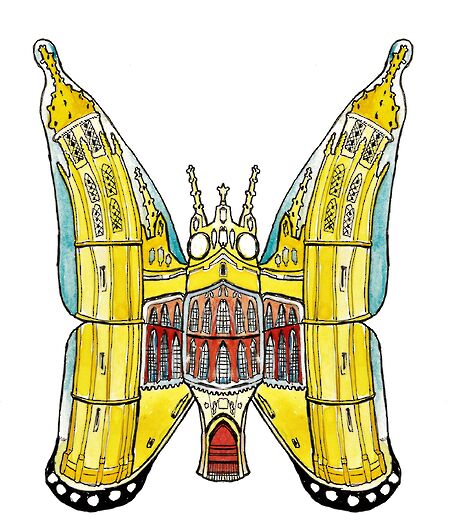Varsity explains: The butterflies in my stomach
During freshers’ week icebreakers or your first DOS meeting, you may feel a fluttering in your stomach. The reason for these butterflies is rooted in our evolution.

Do you know the feeling that being anxious brings about in your gut? The start of term, an important interview, giving a presentation in front of a large crowd… all of these may produce a sensation we compare to “having butterflies in the stomach”. For some this can even cause nausea and more serious gastric distress. Why? Where does this come from?
This sensation is largely produced by the so-called “fight or flight response”. The autonomic nervous system, ie the part of your nervous system that regulates heart rate, blood pressure, and similar functions, all on its is divided into two main branches, the sympathetic and parasympathetic branches, which mostly oppose each other functionally. The sympathetic system is involved in preparing the body for stressful and dangerous situations, by releasing adrenaline and glucose, increasing your heart rate and blood pressure, and directing blood away from your digestive tract towards your skeletal muscles (ie the muscles that move you). The parasympathetic system opposes this, and is responsible for the “rest and digest” response, contributing to feeling tired and sluggish after a meal, as blood vessels around the gastrointestinal tract dilate and allow the smooth muscle of the gut to do its work best.
If you think about this in terms of evolution, this makes a lot of sense: when you have to run away from the proverbial saber-toothed tiger, you need to have lots of energy available, your heart beating fast, blood flowing through your limbs, ready to sprint away. What you don’t want, is for large amounts of your blood to be used for digesting the lunch you were just having.
These systems prevail, and while we may at most encounter a cow strolling around King’s Backs, the things that cause us stress and anxiety induce similar physiological effects: digestion is slowed as blood vessels in the gastrointestinal region constrict to increase oxygen and glucose delivery to your muscles, and due to the adrenaline release, your muscles in the abdominal wall contract, further slowing down digestion. The sudden and drastic reduction of blood, throughout the intestinal tract, is sensed by sensory neurons, creating the feeling we liken to ‘butterflies’.
 News / Clare Hall spent over £500k opposing busway 24 December 2025
News / Clare Hall spent over £500k opposing busway 24 December 2025 Comment / The ‘class’ of Cambridge24 December 2025
Comment / The ‘class’ of Cambridge24 December 2025 News / Caius mourns its tree-mendous loss23 December 2025
News / Caius mourns its tree-mendous loss23 December 2025 News / Girton JCR publishes open letter expressing solidarity with Palestine25 December 2025
News / Girton JCR publishes open letter expressing solidarity with Palestine25 December 2025 Comment / Yes, I’m brown – but I have more important things to say22 December 2025
Comment / Yes, I’m brown – but I have more important things to say22 December 2025










